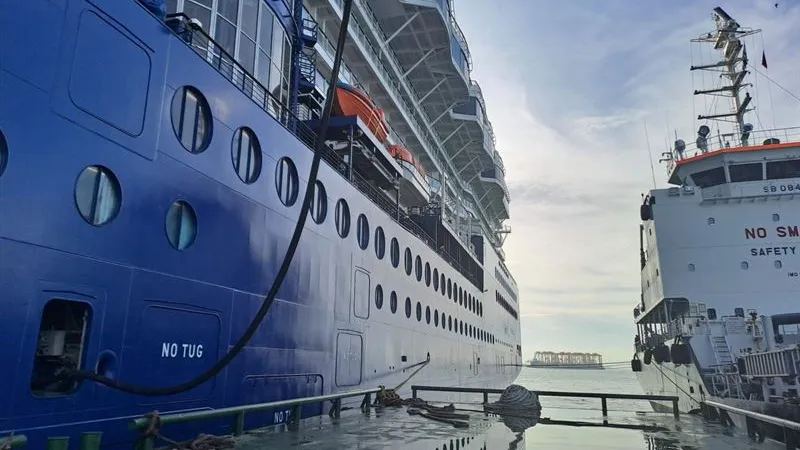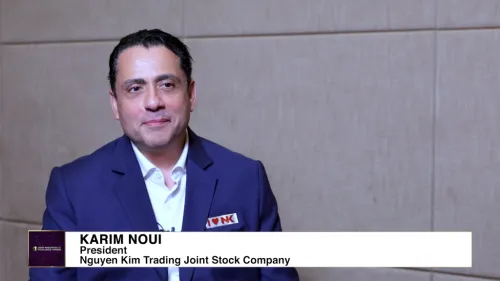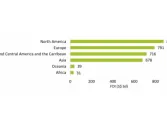
Neste fuels Singapore's cruise sector with renewable diesel
It replaces dirty fossil diesel to help the marine industry hit ‘green’ targets.
Singapore’s cruise industry has taken delivery of renewable diesel made by Finnish oil refiner Neste, in a landmark event that would allow the city-state’s marine sector to cut its greenhouse gas emissions by as much as 90%.
Neste, the world’s biggest producer of renewable diesel and sustainable aviation fuel, worked with London-based marine fuel trader KPI OceanConnect to ship the Neste MY Renewable Diesel to the Singapore Cruise Terminal at Marina South in November 2024, KPI said in a statement.
Neste and KPI announced the transaction, which they said is a leap forward for maritime decarbonisation in the Asia-Pacific region, on 8 January. Neste’s renewable diesel is made from vegetable oil and waste animal fats and replaces fossil diesel to help the industry meet its “green” goals.
“The most significant advantage for companies is that they can achieve up to 90% emission reduction without making any modifications to the existing engines or vehicles, requiring no additional cost to make the switch,” Ee Pin Lee, head of commercial for the Asia-Pacific region at Neste, told Asian Business Review.
“Neste MY Renewable Diesel is a cost-efficient solution to reducing greenhouse gas emissions, especially when taking into consideration the well-to-wheels approach,” she said, referring to the environmental impact of a vehicle's energy use throughout its entire life cycle.
Singapore was chosen for the first renewable diesel delivery in the region given its leadership in the marine industry, Lee said.
The city-state was No. 1 in the Xinhua-Baltic International Shipping Centre Development Index report for 2024, a spot it has held for the past 11 years.
The Port of Singapore's vessel tonnage breached 3 billion gross tonnage (GT) for the first time in 2023, posting 9.4% growth from a year earlier, according to the report. It grew 0.6% to 3.11 billion GT last year, spurred by increased activity from bulk carriers, container ships, and tankers, data from the Maritime and Port Authority (MPA) of Singapore showed.
The island nation’s container throughput rose 5.4% to a record 41.12 million 20-foot equivalent units (TEU) in 2024, the agency said. There are 11 berths operating at Singapore’s Tuas port, with seven more to follow by 2027.
Lee also cited the state’s sustainability efforts for the maritime industry, including the publication of a decarbonisation blueprint in 2022 seeking to hit net-zero by 2050.
The blueprint calls for the development of alternative fuels and green technologies to cut reliance on fossil fuel. Major port operators Jurong Port Pte Ltd. and PSA Corporation Ltd have committed to shift to cleaner fuels in the coming years.
The MPA earlier said Singapore is working with partners and the international shipping community to digitalise, enhance energy efficiency, and deploy low and zero-carbon emission marine fuels.
Renewable fuel solutions are urgent as the world experienced the warmest year on record in 2024 at about 1.55 degrees Celsius above the pre-industrial level, Lee said, citing data from the World Meteorological Organization.
She noted that unlike Europe where there are mandates in place for road transportation, the Asia-Pacific region lags on policies and diesel fuel standards.
“There is optimism that the public and private stakeholders will collaborate to accelerate the adoption of renewable diesel as a long-term viable solution,” Lee said.
She added that Neste is working on expanding its presence across various sectors in the region. “Besides marine, some of the key sectors include mining, medium- and heavy-duty transport, data centres and construction.”
















 Advertise
Advertise







